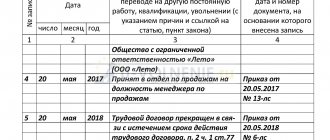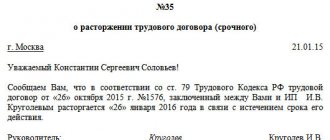Fixed-term contract
To understand whether the administration is right or wrong, you need to figure out what functions you are being offered to perform. There are works that are constantly carried out in production, mainly permanent personnel take part in them. But not always. If the main employee is temporarily absent (on maternity leave, for example), then he is replaced by another specialist with whom a fixed-term contract is signed. This means that the document should indicate its end date. It coincides with the entry into service of the main specialist. This situation was also in the previous legislation. In addition, under such conditions a person is hired for temporary work. Let's say a company decides to carry out reconstruction. It can only be entrusted to such a highly professional specialist. He is invited for the duration of the work, concluding a fixed-term contract. The document indicates either the date of dismissal, if it can be determined, or the amount of work required. Upon their completion, the contract is considered completed. The entire list of situations where it is possible to limit the term of service is described in Art. 58, 59 Labor Code of the Russian Federation. The latter indicates cases when the conditions of employment for a specific period must be agreed upon with the employee.
Early termination
In accordance with the comments to Art. 58, 59 of the Labor Code of the Russian Federation and clarifications of the Supreme Court of the Russian Federation, termination before the official expiration date of an employment contract is possible on the same grounds as in the case of an open-ended one. They are exhaustively listed in Art. 77 TK:
- at the initiative of the employee;
- by mutual agreement between the parties;
- due to circumstances that do not depend on the will of the parties; for example, conscription of an employee for military service.
In addition, a citizen performing work under an employment contract with a fixed validity period has the right to submit a letter of resignation at any time. It is important to comply with the deadlines established by the legislator.
If a citizen works under a contract whose duration does not exceed 2 months, or for a period of seasonal work, he must submit an application no later than 3 days before the expected date.
Special cases
In fact, our article is quite lengthy for a practitioner. It covers almost all possible situations that arise in certain conditions. Thus, a fixed-term contract is allowed to be signed for seasonal or temporary work, sending a specialist abroad, with trainees or those undergoing practical training. The same document is signed by people who received positions as a result of elections. Detailed information about this is contained in Art. 59 TK. Sometimes the service life of specialists is linked to the contract of a superior person. For example, when they hire the chief accountant of a university. This person can perform his duties only until the rector is dismissed. Such situations are determined by special by-laws.
What is the difference between a contract with a temporary employee and a contract with a permanent one?
Most workers are much more willing to take a permanent job than a temporary one. An employee who has entered into a contract with an indefinite duration has much more rights than a temporary employee. Permanent employees do not have to worry about finding a new job after the contract expires, unlike citizens who have entered into a temporary contract. Labor legislation in our country is structured in such a way that the majority of workers, in order to ensure guarantees of their rights, must be employed on a permanent basis. Employment on a permanent basis implies the conclusion of an employment contract for an indefinite period. There is only a start date for the contract. When concluding an open-ended employment contract, it is impossible to specify the end date in advance. This is its main difference from a contract with a temporary worker concluded for a specific period. In general, the Labor Code does not contain such a concept as a “temporary worker”. It is understood that this is an employee performing work for a certain period of time. According to Art. 59 of the Labor Code of the Russian Federation, temporary work is work that requires up to two months to complete. There is no probationary period for employees performing temporary work. In the context of the issue under consideration, a temporary worker is an employee with whom a fixed-term contract (not necessarily for two months) is concluded, establishing the end date of the period of cooperation. An employer cannot, on its own initiative, decide with which employee to enter into a temporary contract and with which - a permanent one. For this purpose in Art. 59 of the Labor Code of the Russian Federation provides for the grounds on which a contract concluded with an employee may be of a fixed-term nature. If, in the absence of the grounds listed in the article, an employer enters into a fixed-term contract with an employee, his actions can be considered unlawful. A fixed-term contract cannot be concluded for a period of more than 5 years. So, the main difference between a contract with a temporary employee and a contract with a permanent one is the established period of validity of the temporary contract. A fixed-term contract may expire upon the occurrence of a certain date or event. The departure of the main employee to work, the end of the work season, or simply the end of the work period (for example, when a project is completed) entails the termination of the temporary employment contract. A permanent employee, unlike a temporary employee, is not limited by a specific period and feels more protected.
Limits of a fixed-term contract
As is known, the legislator proceeds from resolving any controversial issues between the worker and the employer. It is on these principles that the Labor Code was drawn up. Art. 58 of the Labor Code of the Russian Federation limits the validity period of a non-permanent agreement to five years. When the period specified in the document expires, the employee is considered dismissed. However, there are exceptions. They are proposed to be resolved by agreement of the parties. In Part 4 of Art. 58 of the Labor Code of the Russian Federation talks about just this. If neither the employee nor the manager declares that the contract is terminated, it is considered permanent. In practice, this situation leads to all sorts of incidents. The HR manager may simply not track the expiration date of the contract. If he does not prepare a dismissal order, it will be difficult to get rid of the employee. The court will support his request to provide him with a permanent position.
Renewing a fixed-term employment contract
Re-signing an employment contract with a specified period, in essence, represents the execution of a new agreement with a person who has already worked in this institution. It is not advisable to make an additional agreement in this case.
According to the terms of the new employment contract, the employee can take up the same work or another. It can come into effect immediately after the old one is terminated. Re-negotiation is possible in the following situations:
- It is again permissible to conclude a fixed-term employment contract (Article 58 of the Labor Code of the Russian Federation) when it is impossible to conclude an open-ended one due to the circumstances. For example, an employee worked in a position for which the main employee was absent. However, by the time he was supposed to return from vacation, another maternity leave job became available.
- The employee belongs to one of those specified in Part 2 of Art. 59 TC categories. For example, creative theater employees.
The re-conclusion takes place in two stages: dismissal based on the expiration of the old employment contract and subsequent acceptance under a new agreement. Do not forget that in accordance with the comments to Art. 58 of the Labor Code of the Russian Federation, such repeated registration of labor relations to perform the same work for a short period is fraught with consequences for the employer. The court or the Labor Inspectorate may recognize such an employment contract as unlimited.
How is an agreement drawn up in practice?
The worker has no time for papers. He will have to sign a lot of them upon entering the service. To understand what the working conditions are, read the appointment order. It is in this document that the conditions for employment are indicated, that is, what kind of contract is signed. If there is no end date or other conditions, consider it permanent. By the way, see if the order contains a reference to Art. 58 Labor Code of the Russian Federation. Comments on this provision of the law say that it is necessary to conclude a fixed-term contract based on it specifically. That is, the order not only indicates the end date of the employment relationship, but also the reason for such a decision. If this is a temporary job, you should write down what its nature is. A person is hired in connection with the maternity leave of the main employee, for the period of drawing up a report, or something else.
Commentary on Article 58 of the Labor Code of the Russian Federation
The commented article provides for two types of employment contracts according to their duration.
The first is an employment contract concluded for an indefinite period. This is how the usual, most common employment contract is concluded. When concluding an employment contract for an indefinite period, the parties determine only the date of its entry into force (see Article 61 of the Labor Code and commentary thereto).
The second type of employment contract is a fixed-term employment contract, which is concluded for a certain period, but not more than five years. In cases directly specified by the Labor Code and other federal laws, other maximum periods may be determined.
According to Part 2 of the commented article, fixed-term employment contracts are concluded when the employment relationship cannot be established for an indefinite period, taking into account the nature of the work to be done or the conditions for its implementation. In this case, reference is made to Art. 59 of the Labor Code, which provides a list of circumstances, both obligatory and allowing to conclude a fixed-term employment contract (see Article 59 of the Labor Code and commentary to it).
When concluding a fixed-term employment contract, the parties themselves determine the specific term of the employment contract, but it cannot exceed the deadline established by the Labor Code and other federal laws.
If, when concluding an employment contract, the parties did not stipulate the duration of the contract, then the contract is considered to be concluded for an indefinite period.
However, when it turns out that circumstances have arisen under which it is possible to conclude a fixed-term employment contract (Part 2 of Article 59 of the Labor Code) or the employer “forgot” to conclude a fixed-term contract with the employee, although he should have done so (Part 1 of Article 59 of the Labor Code) , in accordance with Part 3 of Art. 57 of the Labor Code, the employment contract must be supplemented with missing conditions, while the missing conditions are determined by an annex to the employment contract or by a separate agreement of the parties to the employment contract, concluded in writing, which becomes an integral part of the employment contract.
In Resolution No. 2 of March 17, 2004, the Plenum of the Armed Forces of the Russian Federation clarifies that when concluding a fixed-term employment contract with persons entering work in organizations created for a clearly defined period or to perform a clearly defined work (paragraph 7, part 1, article 59 of the Labor Code ), the term of the employment contract is determined by the period for which such an organization was created. Termination of an employment contract with these employees on the basis of expiration of the employment contract can be carried out if the organization actually ceases its activities due to the expiration of the period for which it was created, or the achievement of the purpose for which it was created, without transfer of rights and obligations in the order of succession to other persons (Article 61 of the Civil Code).
If a fixed-term employment contract was concluded to perform certain work in cases where its completion cannot be determined by a specific date (paragraph 8, part 1, article 59 of the Labor Code), then such an agreement, by virtue of part 2 of art. 79 Labor Code is terminated upon completion of this work.
You should know that the term of an employment contract can be determined either by a specific calendar date or by the expiration of a period, which is calculated in years, months, weeks, days and hours. In addition, the duration of the employment contract can be determined by indicating a specific event, for example, the duration of the duties of an absent employee. An employment contract concluded for the duration of the duties of an absent employee is terminated when this employee returns to work.
Upon expiration of the employment contract, the employment relationship is terminated. However, if none of the parties demanded its termination and the employee continues to work after the expiration of the employment contract, then the condition on the fixed-term nature of the employment contract loses force and in this case it is considered that the employment contract is concluded for an indefinite period. In other words, a fixed-term employment contract is transformed into an employment contract with an indefinite period. Termination of the employment contract in this case is possible only on a general basis (see Article 77 of the Labor Code and commentary thereto).
In paragraph 14 of the Resolution of the Plenum of the Armed Forces of the Russian Federation dated March 17, 2004 N 2, it is noted that when it is established during the trial that the fact of multiple conclusions of fixed-term employment contracts for a short period of time to perform the same labor function, the court has the right, taking into account the circumstances of each case, to recognize the employment contract concluded for an indefinite period.
If a fixed-term employment contract was concluded with an employee without sufficient grounds, i.e. without taking into account the conditions and requirements of the Labor Code, then such an agreement is considered concluded for an indefinite period. These grounds are established only by the court.
The law prohibits the conclusion of fixed-term employment contracts in order to evade providing the employee with benefits and guarantees that are provided for employees with whom an employment contract has been concluded for an indefinite period. Unfortunately, this is a very common violation of labor laws, and it mainly concerns the use of labor by women, youth and pensioners.
Resolving controversial issues
The legislation was adopted in such a way that the worker does not suffer from the arbitrariness of the administration. Our case is no exception. If there is something you do not understand, contact your HR manager for clarification. Let the specialist justify the provisions of the documents provided to you. Can’t he or there are still unresolved issues? Go with them to the regulatory authority. Remember that the judiciary in many cases takes the side of the worker. The employer will have to explain on what basis it limits the specialist’s service life. Moreover, his arguments must fully comply with the provisions of the law. Otherwise, the contract will be converted into a permanent one. Feel free to go to court if you suspect your employer of fraud.
Art. 59 Labor Code of the Russian Federation: questions and answers
Art. 59 of the Labor Code of the Russian Federation outlines the circle of persons with whom it is mandatory or possible to conclude a fixed-term employment contract. In the article we will tell you when this is required and when it is allowed, and also answer the most common questions related to the conclusion of such agreements and the application of the provisions of Article 59 of the Labor Code .
https://youtu.be/dKJTsXfvALc
What does the article talk about? 59 of the Labor Code of the Russian Federation with comments 2015–2016?
In what cases, according to Article 59 of the Labor Code of the Russian Federation, is a fixed-term employment contract required (Part 1 of Article 59 of the Labor Code of the Russian Federation)?
When is it allowed to conclude an agreement with an employee for a limited period (Part 2 of Article 59 of the Labor Code of the Russian Federation)?
For how long is temporary employment possible?
What conditions, in addition to the validity period, must be included in a fixed-term employment contract?
Is a record of work under a fixed-term contract entered into the work book?
Is it allowed to extend an employment contract concluded for a certain period?
What is the procedure for terminating a temporary employment contract?
How to properly register an employee hired to replace a temporarily absent one?
How to conclude an agreement to perform temporary, seasonal or work outside the scope of normal activities?
What to consider when concluding a fixed-term contract by agreement of the parties?








